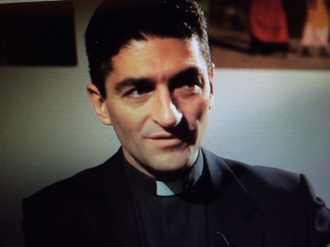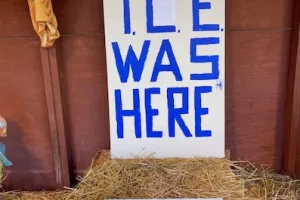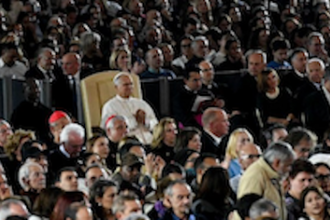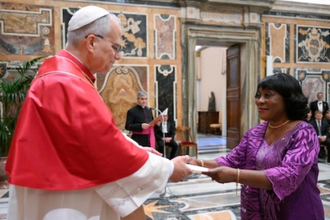Good Friday Reflection with Fr Augusto Zampini Davies

Fr Augusto Zampini Davies gave the following homily at the Celebration of the Lord's Passion on Good Friday at Holy Apostles, Pimlico.
The Passion of Christ is a disturbing story, full of violence, lies, cries, manipulation of power, pain, and, indeed, the dead of the innocent Jesus of Nazareth, who claimed to be King and God. Sadly, our world is also like that, full of disturbing stories where violence is chief, where lies abound, where the powerful keep playing power-games at the cost of the rest, and where many innocent persons cry out because they are hurt, wounded, abandoned, or being killed.
When we witness these events, or when we are part of them, we cannot be indifferent. A colleague of mine from CAFOD was deeply moved by a killing of some Christian and Muslim families in Syria who were supporting a peace movement. Fr Pat was affected by the killing of four sisters of Mother Theresa's order in Yemen, and the kidnapping of the priest who was with them. And I was shocked by the terrorist attacks in Brussels, probably because I could have been there. I must admit that when I watched the scenes of these atrocities, I couldn't escape having violent feelings and thoughts. Who on earth can possible claim that killing innocent people is an act wanted by god? What kind of god is that?
Behind these two questions were lying some unnerving thoughts. First, I wanted those people who committed the coward and atrocious murders to be punished, I even thought about revenge. But suddenly I realised they had killed themselves, since the terrorist in Brussels were suicide bombers. So what am I supposed to do with my unwanted desires to respond to violence with more violence? / Second, I felt sympathetic with the complaint of many that religion is poisoning people, and therefore what individuals and societies need to do is to get rid of God and religion altogether. Imagine there is no religion; this would surely be a step forward toward peace, as John Lennon would put it. But suddenly I realised I am a religious person, and all my life is based in God. So what am I supposed to do with these anti-religious thoughts?
The Passion of Christ shed light upon these relevant questions that many have today. Regarding violence, Christ suffered it, but did not inflict violence on others. And as soon as one of his disciples, St Peter, tried to defend Jesus with a sword, cutting the ear of the soldier Malchus, he was scolded by Jesus: 'put your sword down Peter', 'put your sword down'; and then he healed the wounded soldier.
God, as revealed by Christ, does not want us to be violent; he wants us to follow him in the path of liberating peace, even if others react violently to our proposals. He wants us to follow the path of healing wounds, even to those we don't like or we consider enemies. God the Father is not a violent crazy god who sends his innocent son to be killed; it was Jesus, his son, who freely decided to reveal the love of the Father, and speak openly to everybody about the kingdom of justice and peace. And he decided to show this love up to the end, perfectly, radically. Moreover, his plea while dying was for forgiveness, even of his executors: 'Father, forgive them, because they don't know what they are doing'. Jesus knows that only peace can free us from violence, that forgiveness can free us from revenge, and that his cross can help us to address violence differently.
So when we talk about the risk of religious radicalisation, we need to be cautious. Yes it's true that people from any religion, Christians included, can and do perform violent actions in the name of their beliefs, either with words or deeds. But this is a denaturalisation of God, a corruption of religion. Truly religious radicalisation, as Christ has revealed, is that of love, is to be peaceful till the end, is to speak overtly about justice regardless of the consequences, is to cry out for the liberation of the poor, is to be merciful, is to give ourselves up for others as opposed to exploiting or killing others for our own sake.
So what to do with our inner violent feelings and thoughts? Let us put them into the cross today; Christ will take them and transform them. That's why he died for us; to free us from everything that hinders actual life, even from violence and death. And what to do with our reluctances to faith and religion? Let us try this Holy Week to get closer to the one who has re-linked heaven and earth, who has overcome death, and who is willing to embrace us so as to bring the light of his resurrection to our most obscure feelings, thoughts or actions. By contemplating Jesus' cross, we don't become naïf persons; on the contrary, we can become more wise and peaceful, because we are able to see the cruelty of his passion and all the sufferings and deaths of our world with new eyes. Behind each single cross, there is hope in a new life.
Fr Augusto is a theological advisor to CAFOD















